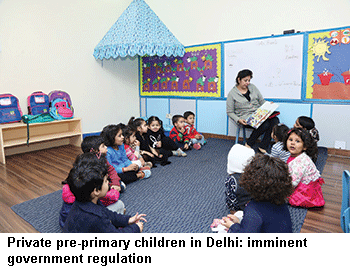 Preschool education for children in the 0-6 age group, hitherto the exclusive domain of unregulated private edupreneurs, may soon experience government regulation. The Delhi-based National Council of Educational Research & Training (NCERT), the country’s largest school textbooks publisher and K-12 education think tank of the Union ministry of human resource development (HRD), is ready with guidelines and a curriculum for early childhood care and education (ECCE). A drafting committee constituted last year under the chairmanship of acclaimed early education expert, Prof. Venita Kaul, professor emeritus at Ambedkar University, Delhi (AUD) and founder-director of Centre for Early Childhood Education at AUD, has completed two drafts and submitted them to the HRD ministry.
Preschool education for children in the 0-6 age group, hitherto the exclusive domain of unregulated private edupreneurs, may soon experience government regulation. The Delhi-based National Council of Educational Research & Training (NCERT), the country’s largest school textbooks publisher and K-12 education think tank of the Union ministry of human resource development (HRD), is ready with guidelines and a curriculum for early childhood care and education (ECCE). A drafting committee constituted last year under the chairmanship of acclaimed early education expert, Prof. Venita Kaul, professor emeritus at Ambedkar University, Delhi (AUD) and founder-director of Centre for Early Childhood Education at AUD, has completed two drafts and submitted them to the HRD ministry.
The guidelines prescribe minimal infrastructure, qualifications and salaries for preschool teachers and support staff, admission processes and records and registers to be maintained, and the role of parents and the community. The ECCE curriculum framework has been designed for two years of preschool before class I. Although, not a few ECCE educationists believe that professionally administered ECCE can’t start too soon, the NCERT expert group has recommended a two-year preschool period for children in the 3-6 age group.
The curriculum framework prescribes three major ECCE goals — children must maintain good health and well-being; they should become good communicators and learn to connect with their immediate environment. It also suggests preschool design basics to ensure child safety and create healthy learning environments.
The initiative to constitute the Kaul committee comes in the wake of the Central government clubbing ECCE, the Sarva Shiksha Abhiyan (primary education), Rashtriya Madhyamik Shiksha Abhiyan (secondary education) and teacher education and subsuming them under a newly formed integrated scheme of Samagra Shiksha (holistic education) which was announced in the Union budget presented on February 1. The Kaul committee was constituted following numerous complaints of negligence, exploitation and reckless management of private preschools which aren’t subject to government regulation.
Way back in 2007, the Delhi high court while hearing a writ petition on nursery admissions constituted a committee under CBSE chairman Ashok Ganguly, which in its report recommended admin guidelines and a curriculum framework for preschools. Moreover, several child activists have for some time been demanding the downward extension of the Right of Children to Free & Compulsory (RTE) Act, 2009 which makes it mandatory for the State to provide (or provide for) free and compulsory education to all children in the 6-14 age group, to ECCE.
NCERT’s guidelines and draft curriculum have been welcomed by early childhood educationists. Swati Popat Vats, president of the Early Childhood Association of India, says the NCERT guidelines and curriculum could be a defining moment for ECCE in India. “If they become applicable countrywide, children in all 29 states and seven Union territories will receive standardised pre-primary education. However, we have also recommended that the age at which children should be admitted into preschools be clearly stated. Nevertheless the NCERT guidelines are valuable and I hope they will standardise and strengthen ECCE in India,” says Popat Vats.
Prof. Kaul is also bullish that NCERT’s curriculum guidelines will upgrade ECCE standards countrywide. “I don’t expect rapid and dramatic change in the pre-primary education sector as it will depend on how preschool education providers respond to them. But now they’ll have guidelines on infrastructure, teacher training and administration. Hopefully an accreditation system for private preschools will follow,” says Kaul.
For the country’s estimated 300,000 private preschools which provide — or claim to provide —professionally administered ECCE to 10 million pre-primary children, the NCERT guidelines and curriculum framework will undoubtedly prove useful. But they will prove even more useful for the 1.6 million anganwadis run by the Central and state governments which provide — or claim to provide — ECCE to over 80 million children in the 0-6 age group. The latter needs them much more.
Autar Nehru (Delhi)